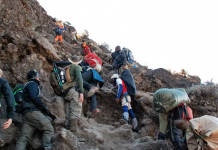A deadly outbreak of an unknown disease in Tanzania has been identified as leptospirosis, health officials said.
More than 20 cases, including three deaths, have been reported in the southern Lindi region, with patients exhibiting symptoms similar to Ebola or Marburg virus diseases — fever, headache, fatigue and bleeding, especially from the nose, according to health officials. Preliminary results from laboratory testing earlier this month had ruled out Ebola and Marburg viruses as well as COVID-19, making the illness a mystery — until now.
Tanzanian Health Minister Ummy Mwalimu announced at a press conference Monday that the samples from patients tested positive for leptospirosis, an infectious bacterial disease that affects both animals and humans.
“I would like to inform the public that sample testing from patients has confirmed the outbreak is leptospirosis field fever or ‘homa ya Mgunda’ as it is known in Swahili,” Mwalimu said. “Up to now, no other person among contacts has shown any symptoms of the disease.”
The first case of the previously unidentified illness was reported at Mbekenyera Health Center in Lindi region’s Mbekenyera village on July 5. Within three days, the hospital had received a second case, according to Tanzania’s chief medical officer, Dr. Aifelo Sichalwe, who had urged the public to “remain calm” and advised anyone experiencing similar symptoms to seek medical attention immediately.
Last week, Sichalwe said the Tanzanian Ministry of Health had dispatched a team of experts to Lindi region to investigate the mysterious outbreak and take measures to prevent further spread, such as conducting contact tracing, identifying people with similar symptoms and isolating them. The World Health Organization’s teams in Tanzania were also “monitoring the situation closely” and working with the Tanzanian health ministry to get “further testing done to rule out other diseases,” Dr. Fiona Braka, team lead for emergency responses at the WHO’s regional office for Africa, told ABC News last Friday.
Leptospirosis is transmitted directly or indirectly from animals to humans, mainly when people come into contact with the urine of infected animals or a urine-contaminated environment. The bacteria enters the body through cuts or abrasions on the skin, or through the mucous membranes of the mouth, nose and eyes. Human-to-human transmission is rare, according to the WHO.
Leptospirosis is easily overlooked and relatively little is known about it, the WHO says. Cases occur worldwide but are most common in tropical and subtropical areas with high rainfall. It’s a potentially serious but treatable disease with symptoms that may mimic those of a number of unrelated infections, such as influenza, meningitis, hepatitis, dengue or viral haemorrhagic fevers, according to the WHO.
Last Thursday, the WHO warned that Africa is facing a growing risk of outbreaks caused by zoonotic pathogens that originate in non-human animals and then switch species and infect humans. There has been a 63% increase in the number of zoonotic outbreaks in the region in the decade from 2012 to 2022, compared with 2001 to 2011, according to a new analysis by the United Nation’s global health arm.
The analysis found that between 2001 and 2022, there were 1,843 substantiated public health events recorded in the WHO African region, of which 30% were zoonotic disease outbreaks. While these numbers have increased over the last two decades, the WHO noted, there was a particular spike in 2019 and 2020 when zoonotic pathogens represented around 50% of public health events. Ebola virus disease and other viral hemorrhagic fevers constitute nearly 70% of these outbreaks, while dengue fever, anthrax, plague, monkeypox and a range of other diseases make up the remaining 30%, according to the analysis.
“Infections originating in animals and then jumping to humans have been happening for centuries, but the risk of mass infections and deaths had been relatively limited in Africa. Poor transport infrastructure acted as a natural barrier,” Dr. Matshidiso Moeti, the WHO’s regional director for Africa, said in a statement on July 14. “However, with improved transportation in Africa, there is an increased threat of zoonotic pathogens traveling to large urban centers. We must act now to contain zoonotic diseases before they can cause widespread infections and stop Africa from becoming a hotspot for emerging infectious diseases.”
The WHO warned that there can be a devastating number of cases and deaths when zoonotic disease arrive in cities, as several West African countries saw with the 2014-2016 Ebola outbreak — the largest and deadliest on record.
“We need all hands on deck to prevent and control zoonotic diseases such as Ebola, monkeypox and even other coronaviruses,” Moeti added. “Zoonotic diseases are caused by spillover events from animals to humans. Only when we break down the walls between disciplines can we tackle all aspects of the response.”
— abcnews
























































